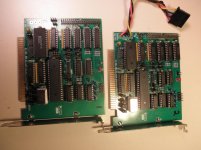hargle
Veteran Member
...soon, very soon.
I have 10 PCBs that I'm kitting up for resale. My parts order from Jameco and mouser are in delivery right now.
Of my 10 PCBs, I have to build up several of them. When I do this, the wiki will get a full update with my parts list and I will post build pics and everything else. I don't want to post my exact parts list just yet, as I have not confirmed that the cards can be built 100% with what I have.
edit:
here's a picture of a completed card.
http://s870.photobucket.com/albums/ab264/hargle/?action=view¤t=IMG_01581-1.jpg
I don't think the jumper settings are correct in this picture; I will post the right ones when I update the wiki.
I have 10 PCBs that I'm kitting up for resale. My parts order from Jameco and mouser are in delivery right now.
Of my 10 PCBs, I have to build up several of them. When I do this, the wiki will get a full update with my parts list and I will post build pics and everything else. I don't want to post my exact parts list just yet, as I have not confirmed that the cards can be built 100% with what I have.
edit:
here's a picture of a completed card.
http://s870.photobucket.com/albums/ab264/hargle/?action=view¤t=IMG_01581-1.jpg
I don't think the jumper settings are correct in this picture; I will post the right ones when I update the wiki.
Last edited:

